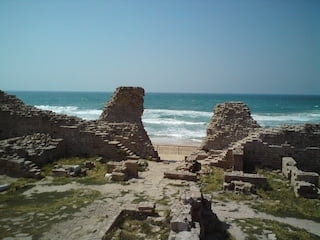 I see that the Israelites were nothing without You, well everyone is nothing without You. You gave them everything, but they basically mock You so now you are going to take it all away and they will be worse off than they were.
I see that the Israelites were nothing without You, well everyone is nothing without You. You gave them everything, but they basically mock You so now you are going to take it all away and they will be worse off than they were.

Ashdod is the sixth-largest city and the largest port in Israel accounting for 60% of the country’s imported goods. Ashdod is located in the Southern District of the country, on the Mediterranean coast where it is situated between Tel Aviv to the North (32 kilometres (20 miles) away) and Ashkelon to the South (20 km (12 mi) away). Jerusalem is 53 km (33 mi) to the east. The city is also an important regional industrial center.
Modern Ashdod covers the territory of two ancient twin towns, one inland and one on the coast, which were for most of their history two separate entities, connected by close ties with each other. This article deals with these historic towns, including other ancient nearby sites, and modern Ashdod.
The first documented urban settlement at Ashdod dates to the Canaanite culture of the 17th century BCE, making the city one of the oldest in the world. Ashdod is mentioned 13 times in the Bible. During its pre-1956 history the city was settled by Philistines, Israelites, Greek colonists coming in the wake of Alexander’s conquests, Romans and Byzantines, Arabs, Crusaders, and Ottoman Turks.
Modern Ashdod was established in 1956 on the sand hills near the site of the ancient town, and incorporated as a city in 1968, with a land-area of approximately 60 square kilometres (23 sq mi). Being a planned city, expansion followed a main development plan, which facilitated traffic and prevented air pollution in the residential areas, despite population growth. According to the Israel Central Bureau of Statistics, Ashdod had a population of 222,883 in 2017, with an area of 47,242 dunams (47.242 km2; 18.240 sq mi).
Ashdod today is home to the largest Moroccan Jewish community in Israel, the largest Karaite Jewish community in Israel, and the largest Georgian Jewish community in the world.
That’s kind of scary because it is only through You that the United States had become the great nation it is. Yet, we went way down hil after President Regan, but finally have a president again, and I think Trump is the best we’ve ever had.
1 In the year that Tartan came unto Ashdod, (when Sargon the king of Assyria sent him,) and fought against Ashdod, and took it;
“The year” – probably 712 B.C.
“Tartan” – refers to Sargon II, who reigned 721-705 B.C. He is mentioned by name only here in the Old Testament.
“Ashdod” – One of the five Philistine cities. Ashdod was located near the Mediterranean Sea about 18 miles northeast of Gaza. The city had rebelled against Assyria in 713 under King Azuri. In 1963 three fragments of an Assyrian monument commemorating Sargon’s victory and mentioning Sargon by name were discovered at Ashdod.
2 At the same time spake the LORD by Isaiah the son of Amoz, saying, Go and loose the sackcloth from off thy loins, and put off thy shoe from thy foot. And he did so, walking naked and barefoot.
“Sackcloth” – normally the garment of mourners, but perhaps also the usual garb of prophets (see 2 Kgs 1:8; Zech 13:4).
3 And the LORD said, Like as my servant Isaiah hath walked naked and barefoot three years for a sign and wonder upon Egypt and upon Ethiopia;
“My servant” – a title for prophets and others used by God in a special way.
“Sign and wonder” – see 8:18, 7:3, 14 and notes. The prophet Ezekiel’s behavior also had symbolic significance (Eze 24:24, 27; cf Zech 3:8).
4 So shall the king of Assyria lead away the Egyptians prisoners, and the Ethiopians captives, young and old, naked and barefoot, even with their buttocks uncovered, to the shame of Egypt.
5 And they shall be afraid and ashamed of Ethiopia their expectation, and of Egypt their
glory.
“Ethiopia their expectation…Egypt their glory” – after Assyria conquered the northern kingdom of Israel in 722-721 B.C., King Hezekiah of Judah was under great pressure to make an alliance with Egypt. Israel urgently warned against such a policy (cf 30:1-2, 31:11).
6 And the inhabitant of this isle shall say in that day, Behold, such is our expectation, whither we flee for help to be delivered from the king of Assyria: and how shall we escape?
The Sins and Chastising
of King Nebuchadnezzar

Like other primitive races the peoples of Chaldea scarcely discriminated at all between religion and magic. One difference between the priest and the sorcerer was that the one employed magic for religious purposes whilst the other used it for his own ends. The literature of Chaldea—especially its religious literature—teems with references to magic, and in its spells and incantations we see the prototypes of those employed by the magicians of medireval Europe.
Indeed so closely do some of the Assyrian incantations and magical practices resemble those of the European sorcerers of the Middle Ages and of primitive peoples of the present day that it is difficult to convince oneself that they are of independent origin.
In Chaldea as in ancient Egypt the crude and vague magical practices of primeval times received form and developed into accepted ritual, just as early religious ideas evolved into dogmas under the stress of theological controversy and opinion. As there were men who would dispute upon religious questions, so were there persons who would discuss matters magical.
This is not to say that the terms ‘religion’ and ‘magic’ possessed any well-defined boundaries for them. Nor is it at all clear that they do for us in this twentieth century. They overlap ; and it has long been the belief of the writer that their relations are but represented by two circles which intersect one another and the areas of which partially coincide.
That Chaldean magic was the precursor of European mediaeval magic as apart from popular sorcery and witchcraft is instanced not only by the similarity between the systems but by the introduction into mediaeval magic of the names of Babylonian and Assyrian gods and magicians.
Again and again is Babylon appealed to even more frequently than Egypt, and we meet constantly with the names of Beelzebub, Ishtar (as Astarte), Baal, and Moloch, whilst the names of demons, obviously of Babylonian origin, are encountered in almost every work on the subject. Frequent allusions are also made to the ‘wise men’ and necromancers of Babylon, and to the ‘ star-gazers ’ of Chaldea. The conclusion is irresistible that ceremonial magic, as practised in the Middle Ages, owed much to that of Babylon
King Nebuchadnezzar’s sin and punishment is a profound story of how God can bring a proud man low. He was the first world emperor and within a short time of his reigning power he was shown that God was the only true God.
In Daniel 2:1 the king had disturbing dreams, but he couldn’t remember them or what they had meant, so he called in his magicians, astrologers or sorcerers to remind him what the dreams were and what they meant, but they couldn’t do it. God told His prophet Daniel what the dreams were and what they meant (Dan 2:24-45 and 45:10-27).
The first dream revealed to the king that he was nothing without God and that the true King, the true Empire, is Jesus Christ (Dan 2:44-45; Lk 1:32-33; Rev 19:16). The second dream showed the king what his pride was going to cost him.
. . .
The king had become extremely proud of himself and made himself an image of gold and worshiped the pagan god Marduk. One year later, Nebuchadnezzar, being extremely prideful, walked into the palace of the kingdom of Babylon and:
The king spake, and said, Is not this great Babylon, that I have built for the house of the kingdom by the might of my power and for the honor of my majesty?
While the word was in the king’s mouth there fell a voice from heaven saying, “O king Nebuchadnezzar, to thee it is spoken; The kingdom is departed from thee.
And they shall drive thee from men, and thy dwelling shall be with the beasts of the field: they shall make thee to eat grass as oxen, and seven times shall pass over thee, until thou know that the most High ruleth in the kingdom of men, and giveth it to whomsoever he will.
The same hour was the thing fulfilled upon Nebuchadnezzar: and he was driven from men and did eat grass as oxen and his body was wet with the dew of heaven till his hairs were grown like eagles’ feathers, and his nails like birds’ claws (Dan 4:30-33).
When God says something, it happens:
So shall my word be that goeth forth out of my mouth: it shall not return unto me void, but it shall accomplish that which I please, and it shall prosper in the thing whereto I sent it (Isa 55:11).
Most people have to hit rock bottom for them to realize that we are nothing without God. Once Nebuchadnezzar hit bottom he repented:
And at the end of the days I Nebuchadnezzar lifted up mine eyes unto heaven, and mine understanding returned unto me, and I blessed the most High, and I praised and honored him that liveth forever, whose dominion is an everlasting dominion and his kingdom is from generation to generation.
And all the inhabitants of the earth are reputed as nothing: and he doeth according to his will in the army of heaven, and among the inhabitants of the earth: and none can stay his hand or say unto him, What doest thou?
At the same time my reason returned unto me; and for the glory of my kingdom, mine honor and brightness returned unto me; and my counselors and my lords sought unto me; and I was established in my kingdom and excellent majesty was added unto me.
Now I Nebuchadnezzar praise and extol and honor the King of heaven, all whose works are truth and his ways judgment: and those that walk in pride he is able to abase (Dan 4:34-37).
It took King Nebuchadnezzar seven years to finally repent, it took me 24 years, how long did it take you, or have you not repented yet? Repentance isn’t just apologizing for your sins, as so many people somehow believe. Repentance includes change.
Visits: 0
